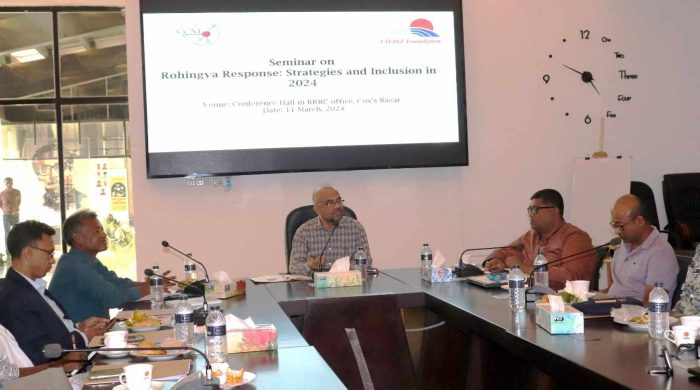
Rights-based civil society rejects World Bank loan in Rohingya response. Along with that, they demanded transparency and inclusive participation for maximum service of Rohingya refugees.
Speakers expressed this opinion at a seminar titled “Rohingya Response in Cox’s Bazar: Strategy and Inclusion for 2024” at the conference room of the Office of Rohingya, Relief and Repatriation Commissioner in Cox’s Bazar on Monday (March 11) afternoon.
Rohingya, Relief and Repatriation Commissioner Mizanur Rahman presided over the seminar organized by Cox’s Bazar CSO NGO Forum (CCNF) and Coast Foundation.
He said that the Bangladesh government is determined for the safe return of the Rohingya people, however, a different situation prevails in Myanmar at the moment.
He also said, until then we have to try our best. He also said that the government is aware of the sufferings of the Teknaf prison community and the local people trapped in the camps.
UNHCR representative Yoko Akasaka, WFP representative Emmanuela Masayo, ISCG deputy leader Mr. The chairman and commissioners of three local union councils including Veda were present.
Co-Chair of CCNF and Executive Director of Coast Foundation Rezaul Karim Chowdhury and Member Secretary of CCNF and Assistant Director of Coast Foundation Jahangir Alam moderated three separate keynotes in the seminar.
One is about 3,000 fishermen, who mainly depend on the Naf River for fishing but fishing has been banned there since 2018, the second is about 14,000 local communities living in captivity inside Rohingya camps and the third is the Joint Response Plan. (JRP) 2024 subject. The first two studies were completed by COAST Foundation and essays were presented by COAST’s Tanzir Uddin Roni and JRP by COAST’s Assistant Director Shahinur Islam.
According to the original article, 77 percent of the fishermen and 85 percent of the local population trapped in the Rohingya camps do not receive any outside support to survive. The local people trapped in the camp are constantly facing problems in getting in and out of the camp even for important work like emergency treatment and education of their children. Regarding the fund, it is said that each Rohingya family receives a monthly allocation of $246, but research shows that they are receiving only $69 of various relief items, which is a quarter of the fund. Studies have shown that these costs are exclusive of management costs, staff salaries and training costs. Last year, 65 percent of the demand was funded, but this year it is only 50 percent.
Shahinur Islam demanded transparency in his presentation, why is the World Bank providing grants for the Rohingyas but giving loans for the sake of the local population?
UNHCR’s Yoko Akasaka said they were working on a place-based approach. Emanuela, representative of WFP, praised this initiative and said that such discussions should have a larger scale of participation. ISCG Mr. Veda said that the content presented in this seminar has several aspects that have scope for work. Union Parishad Chairman Maulana Noor Ahmed Anwari, Rashed Mohammad Ali and women members Morjina Akhtar and Khursida Begum also spoke.
General Secretary of Cox’s Bazar Press Club Md. Mujibul Islam said that instead of supplying underground water to the Rohingya camp, surface water should be treated and supplied.
He demanded an immediate ban on the use of all types of plastic in the camp. An NGO leader Mr. Anisul demanded full transparency of pool funds used in the Rohingya response.
Assistant Superintendent of APBN Anish demanded to strengthen the security system of the camp.
While presiding over the seminar, Rohingya, Relief and Repatriation Commissioner Mizanur Rahman said that the local community has shown great sacrifice in providing shelter to more than one million Rohingya people.